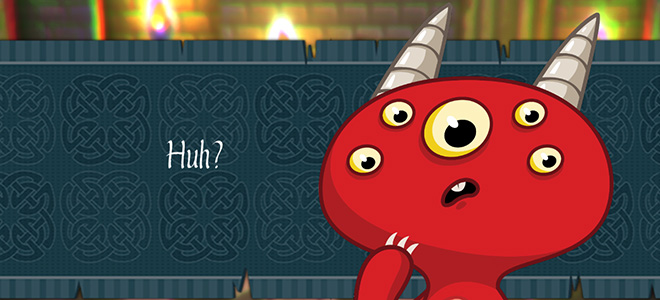Self-reflexive videogames as tools for philosophy is a thought-provoking experiment
The latest journal of GAME, the Italian journal of game studies, was dedicated to the use of game design as critical reflexive practice. This theme was developed from a 2013 DiGRA panel intended as “a step towards a playable theory of game studies”, envisioning a sort of game research that used game development rather than text to produce experiments that were unique to the medium’s affordances. Submissions to this journal were all accompanied by games which were peer-reviewed, with extracts from the review process made public alongside the text. Stefano Gualeni’s article concerns self-reflexive video games, that is to say, games that are self-aware of their constituent parts and subvert expectations in typically satirical or critical ways. Games such as The Stanley Parable and DLC Quest are extreme examples of similar independent games, but elements of this thinking are present in AAA titles such as the Grand Theft Auto or Saints Row series. Gualeni’s article further develops the idea of self-reflexive games to be tools not just for cheap gags, but as philosophical tools that can evoke thoughts in players that the written-word alone could not. The ideas presented in this paper are further elaborated in his 2015 book “Virtual World as Philosophical Tools: How to Philosophize with a Digital Hammer”.
The article begins by placing self-reflexive videogames in a historical context, as part of modernist thinking. Self-reflexive games, that question their own parts and conventions, provoke a sense of unease and inquiry with players, comparable to the goals of the Dadaist and surrealist groups. The modernists believed that this frame of mind, that suggests alternatives states of being, could allow for change at higher socio-cultural levels. Comparisons are also drawn with Bertolt Brecht’s epic theatre, in how the experience is not supposed to be inherently enjoyable, but rather act to support the critical or experiential goals of the artist. The use of subversion and defamiliarization is utilised to keep players unsettled by purposely making visible the parts of games, such as debug information and out-of-bounds player areas, that are typically well hidden.
Gualeni’s game Necessary Evil (available to play at http://evil.gua-le-ni.com) is used as an example of a game containing the above elements. The intention of the game was “playfully problematizing the unquestioned idealistic structuring of virtual worlds”. The game begins by displaying debug information as a dungeon room is built on the screen. The player takes the role of a small creature, whose only interaction with the room is to attack the unbreakable contents. Familiar tropes of the genre such as a treasure chest and locked door are present, but the game lacks the typical actions allowed to the player to interact with these items correctly. After a minute of this limited interaction, set against sound effects of more exciting fighting heard off-screen, the player is attacked and killed by the ‘hero’ character, who proceeds to opens the chest and unlock the door. The debug information is made visible again as the room is loaded out of memory. The game is obviously structured differently to typical games which display the world around the player character’s location at all times, instead demonstrating how areas not visible to the player are loaded out of memory and thus cease to exist.
Making visible the invisible, and allowing players to see videogames “anew”, as possible objects of satire or analysis, allows for self-reflexive videogames to be used as specific critical tools on our culture. Gualeni’s question in this paper specifically asks whether these games are philosophical artifacts. Since Plato, philosophy has been identified with linguistics, written philosophy. However, the written word, and language as a whole, can be understood as a limited form of expression. The paper references game scholar and designer Ian Bogost who has suggested, as an alternative to writing, that we should embrace “building”; constructing artefacts that can communicate elements of scholarship more efficiently than text alone. Games, and the construction of virtual worlds, are not exceptional in comparison to other media, and have their own limitations and problems. Regardless, there are possibilities for games to mediate thought in some instances that could be superior to other forms of media, thanks to the unique affordances of games. It can be limiting to communicate some philosophical concepts in text alone, and similarly through using only games without further context. It is suggested then, that the hybridization of media forms could be beneficial for numerous philosophical thoughts and practices. In conclusion, virtual worlds should be understood as a tool holding great potential for the thinkers of our time.
Original Article: http://www.gamejournal.it/gualeni-self-reflexive-videogames/
You might also like
More from Game Research Highlights
How do you want to do this? – A look into the therapeutic uses of role-playing games
Can playing RPGs contribute positively to your wellbeing? A recent study aims to find out how RPGs are being used …
Eldritch horrors and tentacles – Defining what “Lovecraftian” is in games
H.P. Lovecrafts legacy lives today in the shared world of Cthulhu Mythos and its iconic monsters. Prema Arasu defines the …
Are Souls Games the Contemporary Myths?
Dom Ford’s Approaching FromSoftware’s Souls Games as Myth reveals the Souls series as a modern mythology where gods fall, desires …
















